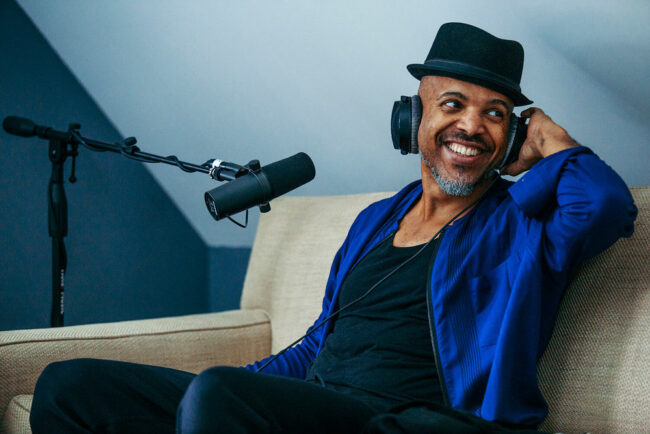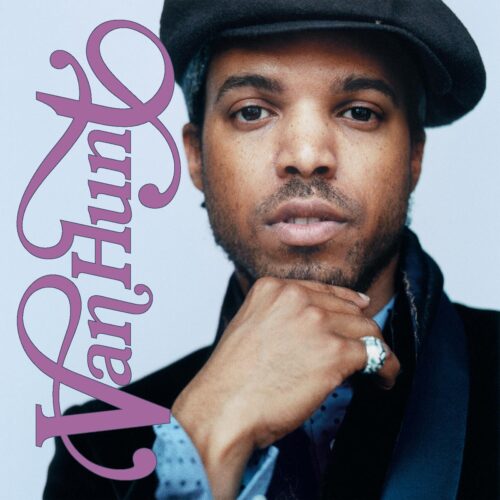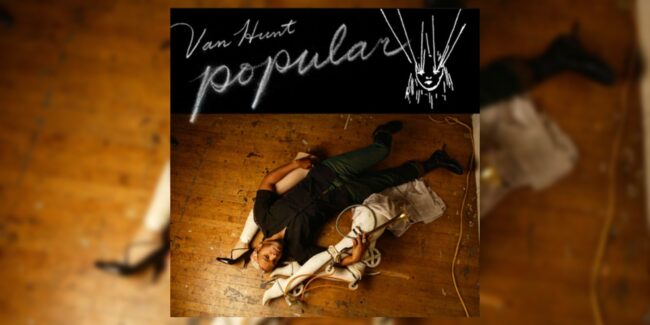Van Hunt is a singer, songwriter and instrumentalist from Ohio, America. He’s been involved in the music world since the 90s, when he initially played guitar and keyboards for Dionne Farris and collaborated with several other notable artists. He embarked on his solo career with his self-titled debut under Capitol Records. Released in 2004, it went on to be nominated for Best Urban/Alternative Performance at the Grammy Awards (later, he went on to win Best R&B Performance by a Duo or Group with Vocals for ‘Family Affair.’)
Hunt went on to release several other critically lauded albums, including On the Jungle Floor and Popular. After transitioning from a major label he has spent the last decade trail blazing as an independent artist, gathering a strong and dedicated fanbase along the way. His music has a unique, quirky and soulful flavour, and I have been following his career with interest for many years. I recently invited Hunt for an interview – he kindly agreed. Here is the result of our exchange…
xxx
F: I want to start by going right back to the beginning of your career and your first two albums with Capitol Records. In a past interview I read with you, you expressed somewhat mixed feelings about your first two albums, which surprised me. Last year you re-recorded your debut album and stripped it back to basics. Did you find the process of doing this made you re-evaluate the merits of the record?
V: Thank you for your interest in my music and my career, and for taking the time. Yes, TRIM, the re-imagining of my 1st album, made me re-evaluate the merits of the record — but, I’d like to begin my response with the former part of your question, re: “mixed feelings”. Just to clarify, my mixed feelings about my 1st record stem from the process of getting it to market more-so than the record itself. The music, no matter how far removed from it I might be, now, was rather innocent. And though I view myself as having shed the skin of that younger man who made that record, I would not be here were it not for those songs.
But, there were interferences with the original state of that music that I think were unfair to its past, present, and potential listeners. They didn’t receive the music quite as I intended. That said, I signed off on every change that was made to my original concepts, and my recent re-evaluation of the record has revealed that the magic remains in the structure of those songs over the 15 years since the record’s release… meaning, the expression was complete.

F: You received acclaim from the likes of Mary J Blige and John Legend, but Capitol seemed to do little to promote those first two albums and much of your following seemed to build more from word of mouth than anything else (that is how I discovered you). Can you shed any light on your experience in the industry during those years?
V: The record label staff worked pretty hard – within the confines they were given – to promote the record. And every record has a degree of paid-for promotion and word of mouth – you really need both to feedback on each other to achieve robust exposure. As for the industry during that time, the influences at the top of the hierarchy were heavy-handed. Men who have no instinct for the spirit of sound were trying to tell me what parts of my expression were valid. It was really quite absurd – the kind of thing you would only encounter in a society overrun with delusion. A delusion predicated on the fictional status we give people who have more money than we…and of course, their importance is based on nothingness, but it has very real consequences. It’s like a stampede through the exits of an arena after a fake bomb threat.
F: You have just celebrated your 50th birthday (happy belated birthday, by the way). Would you say you have experienced ageism in the industry? There have been a lot of stories from artists who seem to have had this experience.
V: Thank you for the birthday wishes! I’m absolutely certain I have experienced ageism and didn’t notice. lol! I’m a pragmatist – I take what they give me and I make it work for me. Someone would have to come show me where ageism has held me back, that I could have more, how it would benefit my music and my child – and then I’d damn sure work just as hard to break free of those restraints as I worked within them. Like anyone, I don’t like being dismissed, taken advantage of, lied to, or disrespected.

F: Your music is extremely versatile, fusing rock, punk, soul and of course, funk, yet in those early days, you were often described as being a part of the “neo-soul” movement. Did this bother you?
V: Oh, God – it STILL bothers me! It HAUNTS me. Because, it also effects my bottom line. Earlier you spoke of ageism being in the way, but it is racism and genre that has been noticeable to me. I’ve had white men tell me that they took one look at my picture on the front of an album or magazine and tossed it in the “______(fill in the blank with any stereotypical reference to African-American recording artists) bin”. My issue hasn’t been so much with being included with other black artists, but the bottom line is we don’t all sound the same. I would never put Nirvana in the same sonic bin with Pearl Jam, or The Beatles with The Rolling Stones, or even Neil Young with Crosby, Stills, Nash AND YOUNG!
You should look me up on Spotify and tell me if you think I sound like ANY of the 7 or 8 artists the algorithm tells you other “people also like.” And, it’s not that people can’t like a “neo-soul” artist and Van Hunt, but they also like James Taylor, Little Dragon and neo-soul artists, or David Bowie, the XX, and Van Hunt. These banal, race-based categories that hide behind AI are completely limiting and ridiculous, insulting to the artists and the listeners, and just plain lame.
F: Can you recall any industry pressure in those early years, to write or record with certain artists or producers? It seemed that you were afforded quite a bit of creative freedom, was this something you had to fight for and do you feel you paid a cost for it?
V: I was often pressured to work with others. Most often I did work with others when requested. But, sometimes I refused, based on what we just spoke of; which is to avoid being further pushed into a branded box. That said, I was given more creative freedom than the typical recording artist of that time. I did have to fight to remind other people, and myself at times, that I had creative freedom. I’m sure I paid a price for it – but as I said, as long as I have what I need to express myself, I feel mostly no regret.
“I was given more creative freedom than the typical recording artist of that time”
F: Your next move was to Blue Note Records, where you recorded the fan favourite, 2008’s Popular. Anyone who has followed your career closely, knows that the album wasn’t released until over a decade after its initial intended release. The record was a revelation for many, yet it remained buried for so long. How did you cope with this setback and did it effect you moving forward?
V: As you might’ve figured out by now, I tend to ignore things that might rightfully give others pause. I was numb for most of the 10 years that ‘Popular’ sat on the shelf. I paid no attention to the chasm it left in my catalogue. But, now that I can look back 2 and 1/2 years on its release, I can say that I resent it not being given a more lavish launch; 10 years ago or 2 and 1/2 years ago.
I’m relieved that people can go to Spotify and find that record with my name on it, but it needs to be on vinyl. And, it should be said more loudly that this record fills in the space between what most people know of me (my 1st two records) and where I went, artistically, from there. Blue Note should be proud of that record, and the fact that they put it out – even 10 years later – and they should invest in letting people see my end of their range of artists, investment, and sounds.
F: You have been an independent artist for the past decade. How has your experience been as an indie artist and what are the advantages/disadvantages, compared to having major label support?
V: I wouldn’t say there are any advantages to not having the funding you need to make the music you want to make – which has often been the situation for me as an independent artist. But there are CLEAR advantages to sitting down with the team you’ve built and mapping out the life cycle of a record release — something I have done in a more articulate way as an independent artist than I ever did as a major label artist. It’s the kind of thing that should happen as a microcosm within a larger system, e.g., an independent artist existing inside of a major label (which is happening more often, now, by way of artists having to build significant followings BEFORE attracting major label investment).
And, of course, there always were such meetings inside of larger record labels, but it’s always with the money, the ego, the fear of losing a job…as the main motivation behind the outcomes. Hardly ever was music the primary – or even among the primary – focus. And artistry wasn’t even on the power point.
F: Following the release of What Were You Hoping For? you announced that you intended to retire from the industry and work more behind the scenes. I remember being very disappointed when you announced this, and thankfully you reversed that decision. Can you elaborate on why you felt the need to retire in the first place, and what it was that lured you back?
V: Sure, there were diminishing returns on the effort I put in to making records. That’s no fun – not for me or the people close to me. I decided to try and be “normal”. I soon realized, most emphatically, that I’m not made to be “normal”. I’m not superhuman or special…my training just doesn’t allow me to fall into the conditioning that most of us have had to in order to perform at our jobs. I’m an artist. Really, an expressionist. I understand expression. The origins of it. The reason for it. Its importance. I am trained in that. I’m good at it. So, I came back with a mission to surface it. To that end, I do work more behind the scenes, now, along with continuing my artist’s career. I am managing artists, speaking at scholastic music programs, and helping established artists develop their apparatus for expressing themselves.
“I soon realized, most emphatically, that I’m not made to be ‘normal’…”
F: Your last full-length album, 2015’s The Fun Rises, The Fun Sets was funded using PledgeMusic, which has now unfortunately gone into liquidation. Would you consider another crowd-funded project in the future?
V: I view every project I do now as crowd-funded (I’ve done three projects since TFRTFS). It’s not articulated that way, but I can certainly make the argument; since every project is direct-to-fan. There’s still something unsettling about asking, directly, for funding from listeners to produce art for them to listen to. The reason is simple: I don’t make art for people. Because art is expression, it is a need to solve something from within the artist. When you write and record for other people, you are performing the craft of songwriting – or expressing on behalf of others. I may do that incidentally as an artist, but I loathe the idea of doing it on purpose. What I enjoy is HELPING others to express their own anxieties. You can write songs without art, but art in a musical form has to use songwriting to manifest itself.
I didn’t feel guilty about taking money from corporations to fund my art – as far as I was concerned, they were investing in MY ideas. The listeners may feel like they’re doing that as well – but I just can’t accept that from them. I want them to find what i do – give it an ear – and if they like it, take the steps to have it in their life. And I hope that when they’re not listening to me or some other artist expressing ourselves, that they are somewhere expressing themselves. And I’m happy, in whatever way I can, to assist them with this. I think a well expressed world is a more democratic world. A less anxious place to be.
F: You have played onstage with your son in the past. Does he listen to Dad’s music?
God, yes. It’s so embarrassing and head-swelling at the same time. I want nothing more than for him to be proud of his pops. But, I also don’t want him to think that what I’ve laid is an easy path or even a satisfying path to follow; because I don’t think it is. We are not the same person – and I would want to see him utilize his tremendous gifts blazing his own trail. And from what I can tell, he agrees.
F: As an avid Prince fan myself, I’m aware that you have quite a large following within the Prince fan community. I know you have spoken of his influence in the past, I wanted to ask how did his passing effect you?
V: I was shocked, like most of us. I regretted that his significance in my life had waned by the time of his passing. I wanted to feel the loss in a more significant way – a way that would properly represent how much of a debt I owed him; because he was someone I could look up at in the middle of the night and say, “that’s right. I want to do that.”
F: Which three records do you feel have shaped and influenced your own style, both musically and vocally?
V: Richard Pryor, ‘That Nigger’s Crazy’, Thelonious Monk (any record), and J.S. Bach (as performed by Glenn Gould or Pablo Casals). There’s a lot of humor in what I do. A wink and a smile and a detachment that keeps me safe. In this way, my “voice” reminds me of Pryor’s influence. Monk reminds me to be big and humble. He is a net that catches all of music, but remained satisfied with just a few friends, family, and a piano. And Bach…well, nothing need be said about him – if he had analogue tape we (every artist since him) probably wouldn’t need to be here.
F: When can fans expect a new studio album from Van Hunt?
V: Very, very soon.
F: Would you say you are effected by the political climate of our time at all? Does it have any influence on you as a person and your outlook?
V: I’m definitely affected in that it makes me anxious. the march to democracy makes me anxious. Even when its done right it is a slugfest of ideas. The most robust one wins. That’s a daunting horizon, given that we have so much ignorance and misinformation to work through, first, before we even arrive at true democracy.
F: It might be a random question, but as it is such a big issue across the world, I wanted to ask you this: are you personally concerned about the Coronavirus outbreak currently taking hold of the world? Have you been following the issue closely?
V: Coronavirus is scary, but people’s reaction to misinformation – the panic – is even more frightening. Because it outshines the initial conditions and adds physical consequences on top of whatever damage Coronavirus does.
F: Thanks so much for giving me your time, Van. All the best.
V: Thank you! This has been fun.







